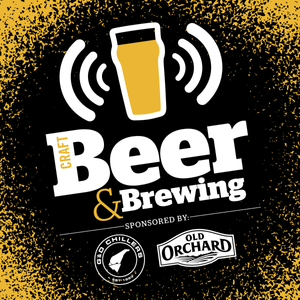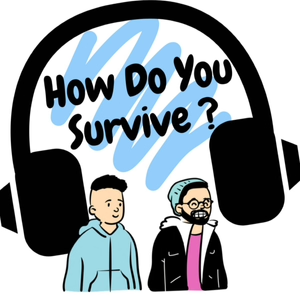
Voice is the next Operation System with Examples from the Drums
04/30/20 • 17 min
In this episode, Teri will share his thoughts on voice and why he believes that voice is the next operating system.
He will be using his drums to illustrate some of the concepts by using them as voices.
Enjoy!
The Evolution of Technology
- Technology has evolved from a keyboard as a way to interface with the computer, to a mouse, and then to a touch screen. Now we are getting to a point where we can speak to a computer.
- There are five main reasons why Teri feels that voice will be the next operating system and he will use a concept based on the five letters of VOICE to explain that.
V for Versatility
- According to Teri’s concept, the V in VOICE stands for Versatile. This means that when one is using their voice, they can do multiple things at once. For example, one can use their voice while driving, cooking, or doing a host of other tasks. That kind of versatility is a key concept of voice.
- Teri will play some very entertaining drum beats, and while we are listening, we should note the fact that each of us will still be doing some kind of task. Listening to the drum beats will not disrupt us from doing what we are doing. That’s the same way that voice will work.
Omnipresence
- This means that voice can be all around us no matter where we are or what we’re doing. One doesn’t need to be looking in the direction of where a voice is coming from to hear it or be aware of it.
- Teri will play the drums again to illustrate how sound can be all around us.
I for Innate
- The first way we communicate when we’re born is through our voices. When we are born, the first thing we do is cry, and we have to learn all other types of communication like read, type, and write, but using the voice is the most innate way that we know how to communicate.
C for Contextual
- This means that when someone says something they can either sound happy or sad.
- Voice allows us to distinguish emotions just from the sound of it. An example of what this means is when someone reads a text message or email, and misinterprets what is being said because they can’t really hear the emotion of the writer.
- One cannot tell if someone is being sarcastic, funny, or mean from their texts or emails, but with voice, one can hear someone’s emotion when they speak.
E for Efficient
- The average person can type about 40 words per minute and speak about 150 words per minute. That’s about a three to four times faster rate of speaking than typing. Voice is therefore extremely efficient, and when a technology is efficient, it tends to be adopted more rapidly.
List of resources mentioned in this episode:
Other useful resources:
- Voice in Canada: The Flash Briefing
- Complete List of Alexa Commands
- Alexa-Enabled and Controlled Devices in Canada
- Teri Fisher on Twitter
- Alexa in Canada on Twitter
- Alexa in Canada Facebook Page
- Alexa in Canada Community Group on Facebook
- Alexa in Canada on Instagram
- Please leave a review on iTunes
- Shopping on Amazon.ca
Hosted on Acast. See acast.com/privacy for more information.
In this episode, Teri will share his thoughts on voice and why he believes that voice is the next operating system.
He will be using his drums to illustrate some of the concepts by using them as voices.
Enjoy!
The Evolution of Technology
- Technology has evolved from a keyboard as a way to interface with the computer, to a mouse, and then to a touch screen. Now we are getting to a point where we can speak to a computer.
- There are five main reasons why Teri feels that voice will be the next operating system and he will use a concept based on the five letters of VOICE to explain that.
V for Versatility
- According to Teri’s concept, the V in VOICE stands for Versatile. This means that when one is using their voice, they can do multiple things at once. For example, one can use their voice while driving, cooking, or doing a host of other tasks. That kind of versatility is a key concept of voice.
- Teri will play some very entertaining drum beats, and while we are listening, we should note the fact that each of us will still be doing some kind of task. Listening to the drum beats will not disrupt us from doing what we are doing. That’s the same way that voice will work.
Omnipresence
- This means that voice can be all around us no matter where we are or what we’re doing. One doesn’t need to be looking in the direction of where a voice is coming from to hear it or be aware of it.
- Teri will play the drums again to illustrate how sound can be all around us.
I for Innate
- The first way we communicate when we’re born is through our voices. When we are born, the first thing we do is cry, and we have to learn all other types of communication like read, type, and write, but using the voice is the most innate way that we know how to communicate.
C for Contextual
- This means that when someone says something they can either sound happy or sad.
- Voice allows us to distinguish emotions just from the sound of it. An example of what this means is when someone reads a text message or email, and misinterprets what is being said because they can’t really hear the emotion of the writer.
- One cannot tell if someone is being sarcastic, funny, or mean from their texts or emails, but with voice, one can hear someone’s emotion when they speak.
E for Efficient
- The average person can type about 40 words per minute and speak about 150 words per minute. That’s about a three to four times faster rate of speaking than typing. Voice is therefore extremely efficient, and when a technology is efficient, it tends to be adopted more rapidly.
List of resources mentioned in this episode:
Other useful resources:
- Voice in Canada: The Flash Briefing
- Complete List of Alexa Commands
- Alexa-Enabled and Controlled Devices in Canada
- Teri Fisher on Twitter
- Alexa in Canada on Twitter
- Alexa in Canada Facebook Page
- Alexa in Canada Community Group on Facebook
- Alexa in Canada on Instagram
- Please leave a review on iTunes
- Shopping on Amazon.ca
Hosted on Acast. See acast.com/privacy for more information.
Previous Episode

A Conversation with Bianca Phillips - The Voice of Law
In this episode, Teri welcomes Bianca Phillips, a lawyer and leader/researcher in the area of digital health law making, and the founder of the Electronic Health Consulting Group.
Welcome, Bianca!
Bianca is also the host of the Voice of Law Podcast and she advocates for a future where telemedicine will allow for access to healthcare no matter where one lives, where wearables will allow people to predict the onset of disease before it happens, and where clinical outcomes will be improved due to precision and personalized medicine. She believes that the digital health future should balance the needs of both patients and healthcare providers by placing evidence-based approaches and civil rights considerations at the core of digital health law-making. She aims to be a prominent voice for a Digital Health School of Thought founded on these principles.
The Legal Perspective of What’s Going On with COVID-19
- She’s been reading articles around how governments have been tracking and tracing people’s movements to curb the spread of the Coronavirus, and she’s also read articles arguing that the tracking and tracing is a breach of people’s privacy and civil liberties.
- She’s been investigating all that and looking at the international covenant on civil and political rights on how emergencies like the current pandemic are supposed to be dealt with in regard to people’s liberties. She’s actually working with a prominent lawyer in the field and they will be publishing their findings soon.
Online Events and Webinars
- She’s been taking note that everyone is now using telemedicine and she recalls when she used to talk about how advantageous it would be for healthcare, but doctors would laugh at her. People are now utilizing telemedicine out of necessity which is a good thing.
- She’s been attending a lot of Zoom meetings and webinars, and she’s excited for what Teri is putting together with the Voice Den.
- The Voice Den is something that Teri is creating to bring the basics of an in-person event into the online events and webinars that people have been doing. It like a reality TV Show but it will be done virtually, and it will bring on five mystery voice industry influencers, and an audience/participants. The audience will have an opportunity to ask popular questions and engage in a huge way and learn from the influencers.
- One of the influencers will be Bianca and she is so excited about it.
Voice Technology During the Pandemic
- She’s liked how the voice community has come together to talk about the response to COVID-19 and the role that voice is playing in it.
- Digital health is currently coming together with the use of telemedicine, voice technologies, and AI in healthcare. She believes it’s going to be a new world after the pandemic.
Using Telemedicine
- Teri has been using telemedicine while working from home.
- He has come across some limitations like when he has to examine a patient can’t because they're in different locations, so they have to make some kind of plan to deal with that. The patients seem to love the telemedicine because it’s so convenient.
- Bianca feels it’s time to move into the 21st century and utilize digital health. She has noted that there are a lot of studies being done to look into telemedicine and how it works in different contexts. There are more than 30,000 research papers and people are using that research especially during the current crisis.
List of resources mentioned in this episode
- The Comprehensive Flash Briefing Formula Course
- The Electronic Health Consulting Group
- Bianca on Linkedin
- Bianca on Twitter
- Bianca’s Ambassador Profile on Digital Health Today
- The Voice Den
Other useful resources:
Next Episode

Our Favourite Alexa Skills to Play at Home
In this episode, Teri will share some of his favorite skills that we can all use at home particularly while we are self-quarantining at home.
Enjoy!
We are living in very challenging times right now with the COVID-19 pandemic, and we are all spending more time at home than ever before which has led to an increased use of voice assistants. Teri will talk about the five skills that his family uses on a regular basis. They include games and many other ways that they use Alexa for entertainment.
And The Teri Fisher Top Five Skills Are:
#1 - Question of the Day
- This is super fun and the best trivia skill so far in Teri’s opinion.
- It works by asking the user a multiple point question and then keeps track of how the user is doing, gives them points, keeps track of the users streaks, and so much more.
- It's a very fun way of learning some random facts.
- When someone gets their question right, the skill gives them a bonus question. It even has badges that users earn.
- There are lots of gamification aspects to the skill that makes a user want to keep playing.
- It was made by MatchBox.io
- It’s invocation word is, “Alexa, start Question of the Day” or “Alexa, enable Question of the Day”
#2 - Would You Rather?
- This is a game that gives the user a random question, for example, “Would you rather itch all the time or sneeze all the time?”
- Multiple people can play the game together at the same time.
- It has different categories, including General, Magic, and Hogwarts.
- It gives users the answers in terms of what most people say.
#3 - Kid’s Court
- It was done by Pretzel Labs and its awesome especially for kids because Alexa acts as a judge, and she helps to give a judgement on different situations that may be happening at home.
- The user goes to judge Alexa and she rules on something that has happened, typically when kids are fighting or not getting along. They can each state their case, defend themselves, and even learn some law concepts in the process.
- The command for it is, “Alexa, open Kid’s Court”
#4 - Song Quiz
- The command for it is, “Alexa, open Song Quiz”
- It’s a name-a-tune type of skill/game.
- A user can choose the number of players they want and if they’re playing alone, the skill can match them up to play with someone else in the world.
- One can choose music from different decades and it plays a short segment of a song so one can name the title and artist. If one gets both the title and artist right, they get bonus points.
- It’s very well produced and has lots of great sound effects built into it.
#5 - Akinator
- The command for it is, “Alexa, open Akinator”
- It guesses who the user is thinking of and it does that by asking the user a series of questions.
- It amazingly correctly guesses who someone is thinking of most of the time.
List of resources mentioned in this episode:
- Flash Briefing Formula
- VoiceID.ai
- AlexainCanada.ca/Chat
- Question of the Day
- Would You Rather?
- Kid’s Court
- Song Quiz
- Akinator
- TheVoiceDen.com
Other useful resources:
If you like this episode you’ll love
Episode Comments
Generate a badge
Get a badge for your website that links back to this episode
<a href="https://goodpods.com/podcasts/voice-in-canada-podcast-40251/voice-is-the-next-operation-system-with-examples-from-the-drums-1805044"> <img src="https://storage.googleapis.com/goodpods-images-bucket/badges/generic-badge-1.svg" alt="listen to voice is the next operation system with examples from the drums on goodpods" style="width: 225px" /> </a>
Copy




